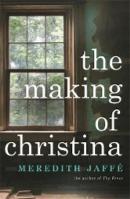 The Making of Christina asks how well we know the people we love and if we can pay the price of truth.
The Making of Christina is not a light read. Its subject matter is trauma, guilt and deceit. The result is neither pretty nor soothing, but this is not its intent. Rather, Christina is about facing the most unpleasant aspects of human nature head-on, with or without a crash helmet, and learning that you can survive. This book will not, therefore, be to everyone’s taste. But the reading can be cathartic for those prepared to brave its depths.
The ‘what’ and ‘who’ are clear from the beginning – if you missed them during the blurb on the back cover, you’ll pick them up soon enough in the opening pages. What counts here is the ‘how’ and the ‘why’, and the reason they matter is because the central question lying at the core of The Making of Christina is whether events could have been foreseen and prevented, and where the blame lies when they are not.
When we meet the title character in the opening pages, it is clear she has been broken:
The Making of Christina asks how well we know the people we love and if we can pay the price of truth.
The Making of Christina is not a light read. Its subject matter is trauma, guilt and deceit. The result is neither pretty nor soothing, but this is not its intent. Rather, Christina is about facing the most unpleasant aspects of human nature head-on, with or without a crash helmet, and learning that you can survive. This book will not, therefore, be to everyone’s taste. But the reading can be cathartic for those prepared to brave its depths.
The ‘what’ and ‘who’ are clear from the beginning – if you missed them during the blurb on the back cover, you’ll pick them up soon enough in the opening pages. What counts here is the ‘how’ and the ‘why’, and the reason they matter is because the central question lying at the core of The Making of Christina is whether events could have been foreseen and prevented, and where the blame lies when they are not.
When we meet the title character in the opening pages, it is clear she has been broken:
Not for the first time, Christina considers how life has narrowed to something she endures. Here she stands on the verandah of the farmhouse in which she grew up, forty-five and living with her mother … Guilt tattoos Christina with the scars and scabs of a rash that came with first knowing and never left … The truth fixes nothing.
The truth fixes nothing. Contrary to the glib advice of endless television chat-show hosts, dragging dark traumas into the light has not led to resolution. Christina’s daughter Bianca spoke the truth, then suffered through the justice system to the point where she felt compelled to flee the country. Her lover Jackson was eventually convicted, but is using his wealth to appeal. Christina speaks the truth to her own mother, Rosa, but gets only frustration in return. ‘Since Bianca left, you’ve done nothing but mope about the house sighing like some … drama queen. So melodramatic.’ And following swiftly on the heels of truth comes judgement. Early in the novel, Christina is revealed to have little empathy for others, being quick to judge and harsh in her assessments. When she first meets Jackson, he is married. He is still married when they embark on their affair, and this has not changed seven years later when they move in together. He ‘had made it clear right from the start that leaving Sarah while the kids were still at school was not an option’, a cliché which Christina is happy enough to accept without probing any further. Nor does she care what impact their affair might be having on his wife and children. To Christina, ‘Happiness had its price’, and she refuses to acknowledge that she may not be the one paying it. When she uncovers evidence of a possible underage affair conducted by the long-dead owner of a historic property she states that it ‘beggared belief that [the mother] was clueless as to Rivers’ transgressions’, even as she fails to notice the events unfolding under her own roof. But when the truth is revealed, this harsh judgement comes rebounding back on Christina in spades. From the doctor who examines Bianca when she mistakenly believes she might be pregnant. From Phoebe, Bianca’s best friend. From Bianca’s refusal to let her mother touch her. And eventually from Christina herself. Is any of this fair? Maybe, maybe not – the novel doesn’t answer this question, leaving readers to decide for themselves. Certainly, whether it is justified or not, the grief and shame and paralysis Christina feels are real and very understandable. But the uncomfortable question the novel poses is — do these feelings serve any purpose? Or are they, as Rosa suggests, a form of self-indulgence that doesn’t help anybody, certainly not Bianca and least of all Christina herself? Perhaps, in the end, Rosa says it best: ‘The human race is full of people who have made terrible mistakes, Tina. None of us are perfect.’ The trick is learning to live with that. Meredith Jaffé The Making of Christina Macmillan 2017 PB 367pp $29.99 Sally Nimon once graduated from university with an Honours degree majoring in English literature and has hung around higher education ever since. She is also an avid reader and keen devourer of stories, whatever the genre. You can buy The Making of Christina from Abbey’s at a 10% discount by quoting the promotion code NEWTOWNREVIEW here or you can buy it from Booktopia here. To see if it is available from Newtown Library, click here.Tags: Australian women's fiction, Australian women's writing, Meredith | Jaffe
Discover more from Newtown Review of Books
Subscribe to get the latest posts sent to your email.






